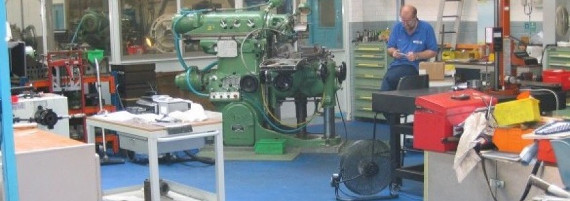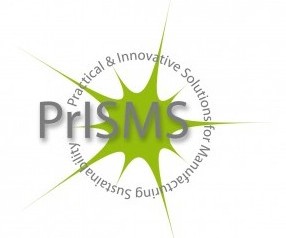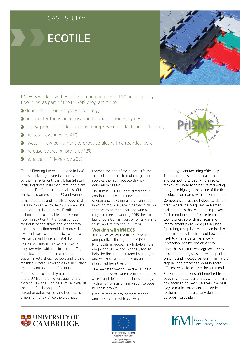Ecotile: boosting growth through innovation and efficiency

Ecotile is one of more than 100 smaller manufacturers that IfM ECS is working with as part of the PrISMS programme – and this case study highlights the difference it has made. The company manufactures and installs unique, hard-wearing interlocking floor tiles for factory, warehouse and commercial premises. The sustainably-produced tiles are injection moulded to provide excellent wear characteristics.
IfM ECS worked with Ecotile as part of the PrISMS programme to:
|
define the business growth strategy |
|
|
put greater focus on innovation to boost business growth |
|
|
review product market groups to improve manufacturing efficiency |
|
|
increase revenues by 41% |
|
|
invest in new equipment to produce tiles with a recycled core |
|
|
increase operating profit by 12% |
|
|
increase staff levels by 20%. |
Ecotile Flooring Ltd was founded in 1996 and is a privately-owned company run by the management team. It has 24 staff, including those in its manufacturing plant in Luton, Bedfordshire, and sales staff to service customers in the UK and Europe.
It manufactures and installs unique hard-wearing floor tiles for factory, warehouse and commercial premises. Ecotile is a simple and sustainable interlocking flooring solution that is robust enough for industry and smart enough for retail uses. It is injection moulded to provide excellent wear characteristics, chemical resistance and long-term stability.
The heavy-duty floor tiles are used in busy factories with forklift truck traffic, high-tech computer server rooms, supermarkets, shops, schools and leisure facilities. Ecotile is available in four surface textures and a variety of colours.
The tiles are sustainably manufactured in the UK from the highest quality raw material and they can be installed without the need for damp-proof membranes, screed or adhesives, saving businesses time and money. Once the tiles have reached the end of their useful life the firm collects them, free of charge, and recycles them to produce the next generation of tiles.
The firm is ISO9001 accredited and it continues to invest in new plant and equipment, including a new twin shot injection moulding machine which allows the tiles to be manufactured with a recycled core. In January 2015 the firm launched a German version of its website to expand its offering in Europe.

Working with IfM ECS
IfM ECS assessed the firm’s priorities and practices through the IfM ECS Prioritisation process, a whole-business diagnostic and action planning tool to help the firm to understand its strengths and weaknesses and draw up an action plan to address them.
The next step was to use the Business Strategy process with the firm’s board to assess and define the business strategy, with an emphasis on innovation to boost business growth.
Product market groups were refined and streamlined with a view to improving manufacturing efficiency. The board focused on its customers and competitors, leading to a radical rethink of where to target its marketing budget to highlight the value of the firm’s products compared with its competitors.
Competence mapping helped to identify areas where the company performed well and areas that could be improved. Each member of the Ecotile team took ownership of these areas and improvement plans were put in place. Operating disciplines were examined to determine how the firm could position itself to offer a better balance of innovation, service and efficiency.
Once this structure was agreed, several process mapping sessions were spent on systems and procedures, examining every step in each process to identify more efficient ways to achieve the same end.
Senior members of staff benefited from coaching in business strategy. The firm is now focused on key customers, the best way to market products and services to them and it has a clearly defined European sales plan.
Innovation and efficiency boost growth
IfM ECS worked closely with the firm to develop a plan for business growth, identifying areas in which to improve efficiencies and putting an innovation process in place to target new product and service opportunities. These interventions, and the results they have brought about, are detailed below.
|
Strategic planning: The board has prioritised the company’s key challenges and formulated an action plan to address them |
|
|
Business strategy: Directors have agreed on, and communicated to all staff, an ambitious growth strategy for the next five years |
|
|
Investment in new equipment: A new twin shot injection moulding machine was purchased. The firm can now manufacture tiles with a 30% recycled core, making this range more cost-effective, sustainable and environmentally friendly. It has also invested in a second robot and ‘drive in’ racking to maximise storage space in the warehouse |
|
|
Increased revenues: Turnover has increased by 41% in just over a year since the start of the engagement with IfM ECS |
|
|
Improved profitability: Following major capital investment, operating profit has still increased by 12%. Both operating profit and turnover are on target to meet projections |
|
|
Jobs created: The assistance provided has helped to strengthen the firm and increase staff levels by four, an increase of 20% |
|
|
Greater innovation: The use of the twin shot injection moulding machine and a shrink-wrap packaging machine puts Ecotile at the leading edge of technology in its sector. Other innovative processes have been developed to enable teams to work more efficiently together |
|
|
Improved efficiency: Manufacturing efficiency was improved by reviewing and streamlining the company’s product market groups to focus on the needs of key customers. Process mapping was used to identify greater efficiencies in the firm’s systems and procedures |
|
|
Improved staff skills: Support and coaching has provided staff with new skills. Senior staff have been given coaching in implementing the business strategy. Support and mentoring has helped staff improve their sales technique and marketing skills |
|
|
Improved sustainability: The firm now uses a higher proportion of recycled materials in its tiles. More efficient processes have resulted in less packaging as well as the use of recycled packaging materials |
|
|
Expansion in the European market: A new German-language version of the Ecotile was launched in January 2015 as customers in Germany, Switzerland and Austria are becoming aware of the firm’s range of products. This is part of the company’s well-defined plan to boost sales across Europe. |
James Gedye, managing director, said: “Working with IfM ECS on our strategy enabled us to really focus on what is important in our business and to develop new systems to complete our processes more efficiently and cost-effectively, leading to growth through innovation.”
For more on Ecotile visit www.ecotileflooring.com.
|
PrISMS The PrISMS (Practical & Innovative Solutions for Manufacturing Sustainability) programme aims to transform the growth prospects of 50 start-ups and 70 smaller manufacturers across the Eastern Region – creating more than 140 new jobs and safeguarding many more. The programme is funded by the European Regional Development Fund (ERDF), with match funding from the EPSRC Centre for Innovative Manufacturing in Industrial Sustainability, ideaSpace and IfM Education and Consultancy Services (IfM ECS) and supported by 11 county and district councils in the region. It is managed and delivered by IfM ECS, which bases its methods on research at the University of Cambridge’s Institute for Manufacturing (IfM). For more information visit here. |
|
IfM ECS IfM Education and Consultancy Services works with companies of all sizes to help create and capture value and with national and regional governments to support and grow their industrial sectors. It does this by transferring the new ideas and approaches developed by researchers at the Institute for Manufacturing (IfM) through a programme of education and consultancy services. IfM ECS is owned by the University of Cambridge. Its profits are gifted to the University to fund future research activities. For more details on its work with SMEs visit here. |
|
ERDF PrISMS is part-financed by the East of England European Regional Development Fund (ERDF) Programme 2007-2013. The Department for Communities and Local Government is the managing authority for ERDF in England, which is one of the funds established by the European Commission to help local areas stimulate their local development by investing in projects which will support local businesses and create jobs. The East of England ERDF programme (covering Bedfordshire, Cambridgeshire, Essex, Hertfordshire, Norfolk and Suffolk) supports low carbon economic growth and has allocated approximately €95 million. |
Download the case study here.
For further information about the work of IfM ECS in the PrISMS programme please contact contact Nicky Athanassopoulou on +44 (0)1223 760376 or naa14@cam.ac.uk; or John McManus on +44 (0) 1223 764908 or jm694@cam.ac.uk.










